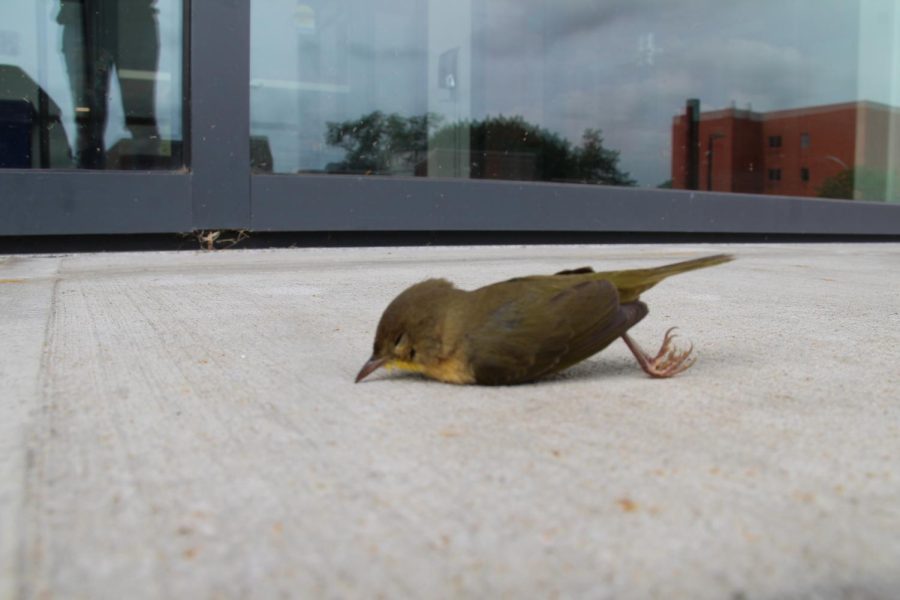University students report multiple dead bird sightings across campus
Photo courtesy of Charger Bulletin/Samuel Weinmann
A dead bird lays on a sidewalk outside of the Bergami Center, West Haven, Sept. 25, 2022.
Over a span of 24 days, student reports have accounted for 10 dead bird sightings, one dead mouse and numerous appearances from a live possum, primarily around the outside of the Marketplace near the Bergami Center.
The following summarize the current bird carcass record as of Sept. 23:
Sept. 1: The first bird is spotted outside of Bartels Hall.
Sept. 2: A second bird is spotted outside of Bartels Hall.
Sept. 9: A dead bird was spotted outside of Celentano Hall in addition to another outside of Bartels Hall.
Sept. 18: Another dead bird is spotted on a sidewalk on campus.
Sept. 19: Another dead bird is spotted in mulch below a tree on campus.
Sept. 24: Another dead bird is spotted outside of the Rec Center, and an additional two dead birds were spotted being consumed by a squirrel under a tree.
Sept. 25: Another dead bird is spotted at the back end of the Bergami Center, near the Marketplace.
When viewing pictures corresponding to these incidents, different coloration and position at the time of death distinguish the carcasses from one another and eliminate the potential of the carcasses being relocated to account for multiple incidents.
Student reports also provide an image of the dead mouse outside of Bartels Hall on Sept. 8, generating a tally of eleven small animal carcasses around the largest dining location on campus.
Additionally, numerous possum sightings have occurred around the Bartels area since the start of the semester, with student reports being recorded on Sept. 12 and 15, under which other students voiced similar sightings.
Dead animals pose the risk of Salmonellosis, Campylobacter and Clostridium perfringens, as well as a number of other zoonotic diseases.
FEMA outlines the potential dangers of the decomposition of animal carcasses, in saying that “The environment is threatened as carcasses decompose and release large numbers of coliform, Clostridia, and other bacterial organisms. When these organisms are shed into the environment, surface and ground water can become contaminated, leading to infringements of EPA and DNR regulations. In the case of intoxications, further consideration has to be given as to whether the toxin will leach into the environment and cause more problems.”
The CDC also outlines that 48 states present risk for West Nile Virus, which is transmitted through mosquitoes. They indicated that dead birds should not be handled with bare hands, as birds both consume mosquitoes and can easily be bitten by them. West Nile Virus has been detected in 23 towns in the state of CT as of Aug. 29, including West Haven, New Haven and a neighboring town of Milford.
Birds and rodents have been sighted numerous times over the span of just under a month.
According to the University Police Department (UPD), the university does not have an animal control office, and inquiring students are redirected to the West Haven Police Department (WHPD)’s Office of Animal Control.
WHPD Animal Control has not responded to a request to comment, however on Sept. 21, Dispatcher Rich Standish said that they do not take care of animals that are on university property.
He also said that there are no legal regulations to consider in terms of animal disposal, and that dead animals should just be “thrown in the trash by facilities workers.” He refused to speak further on the matter.
Dave Crenshaw from the Office of Marketing and Communications outlined a different policy, and said that “We do not have any knowledge or reports of any such events across the University. The University does maintain a program for vermin control that is managed through our Office of Facilities. Should students experience something like this they should contact Facilities.”
The university’s Environmental Health and Safety Department, and representatives under the Environmental and Workplace Safety office also did not respond to requests for comment.
Representatives from the Office of Marketing and Communications said that they were not aware of any incidents of such nature.
On Sept 2., students reported that the Marketplace garbage was overflowing, having not been emptied for several days prior. Updated images showed the garbage removed on Sept. 4.
It is unknown at this time whether sanitation issues are connected to the animals in the surrounding area.

Mia Adduci is a senior studying communication concentrating in multi-platform journalism and media who began writing for the paper her first semester on...






